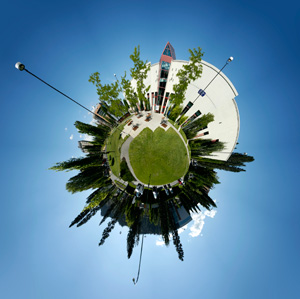by Dr. Tom Owen, Thompson Rivers University Director Environment and Sustainability
Sustainability isn’t a fad—it’s our future. As International Earth Day founder John McConnell said, “Let every individual and institution now think and act as a responsible trustee of Earth, seeking choices in ecology, economics and ethics that will provide a sustainable future.”

Help clean up campus: Participate in TRU Trash Bash on April 22
As one of the community’s largest institutions, Thompson Rivers University takes its impact on the earth seriously.
Environmental Sustainability is one of the campus’s seven founding values, and TRU actively seeks to transform the way we teach, research and operate.
As part of this commitment, TRU has created an Environmental Advisory Council and a department of Environmental Sustainability with three full-time staff.
Representatives from the four campus labour groups as well as the student union and Alumni Association developed a Campus Sustainability Action Plan, a consensus document examining TRU’s ecological footprint, marking a milestone of cooperation: the first time that the entire campus has been involved in a single enterprise.
The public was invited to a thematic series featuring world-class speakers on such topics as climate change, sustainable tourism, ocean plastics and sustainable non-governmental organizations, and created TRU’s first environmental achievement award, to be given out this week.
Along with awareness initiatives, the Environmental Sustainability department works to ensure that sustainability is considered in all decision-making processes from purchasing to course development.
For instance, since TRU is committed to carbon neutrality and reducing emissions to the greatest extent possible, light fixtures have been replaced with more energy efficient units, meters have been installed in all buildings for tracking purposes, and a pilot project using Smart power bars for campus computers, which resulted in a 66 per cent energy saving, has just been completed. TRU’s new energy manager will oversee a complete analysis of all energy use starting this week.
An investment in multifunctional devices is expected to reduce paper use by 50 per cent over the next 18 months, and the campus has used only Green Seal cleaning and paper products since the summer 2009. A big local water user, the university is working to reduce irrigation requirements and has already installed low-flow toilets and waterless urinals.
Reducing pollution and energy use associated with bottled water is being addressed through proactive programs. TRU and its student society gave out 4500 reusable water bottles last year, and new water-bottle refill stations have been installed in all six main campus buildings, resulting in a 12 to 15 per cent reduction in campus bottled water sales. A total of ten such stations will be operational by 2011, bringing the on-campus total of refilling options to near 50.
The old “garbage in, garbage out” rule is changing at TRU. Now it’s garbage in; useful materials out. The campus has just implemented complete mixed recycling to match Kamloops’ curbside program, while cafeteria waste is now used for animal feed, and horticulture waste is composted or chipped.
TRU’s new library is being built to Gold LEED (Leadership in Energy and Environmental Design) standard, and for the first time this year, the Y Dream Home, built by trades students, is a truly “zero-energy” home, one of only 15 in Canada.
Just as trades instructors have embraced and incorporated sustainability into their course work, so have many other TRU professors, who explore environmental topics in classrooms, and in individual research related to a cleaner, greener earth.
What TRU now seeks to do is engage the entire university community in a single, collaborative effort to create a model of campus sustainability. A hard task? Yes, but as Sir Jonathon Porritt said, “The future will be green, or not at all. This truth lies at the heart of humankind’s most pressing challenge: to learn to live in harmony with the Earth on a genuinely sustainable basis.”
And what better place to learn than at a university?

